
The Feminist Strike: How International Women’s Day in Spain Went Radical
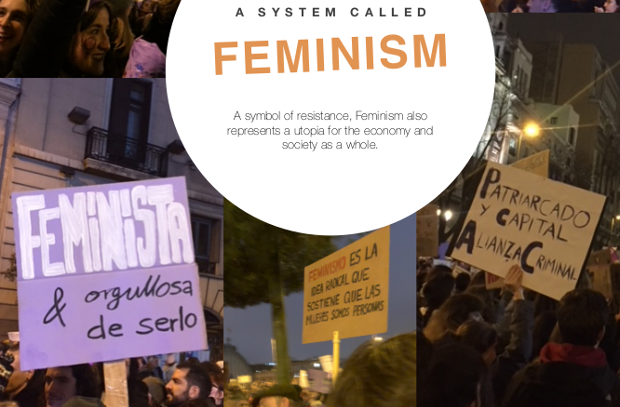
March 8th 2018 was a unique day for women in Spain. Marta Llucia remembers precisely how she felt, demonstrating on the streets of Barcelona as one of 5 million women in the country taking part in a ‘feminist strike’ for International Women’s Day. “I remember perfectly the feeling I had that day,” says the new chief creative officer of Yslandia. “But something very different happened to what I expected. Surrounded by so many beautiful, strong women I understood for the first time the true meaning of the word ‘sorority’. I understood that we were breaking millions of barriers and that at last women were beginning to be more united than ever, to support and love each other, to stop competing each other and become one.”
Executive creative director at Sra Rushmore Xisela López was in Madrid that day, but she felt the same: “Our agency is on Madrid's Gran Vía, smack in the middle of downtown, and that day, millions of women of all generations walked that street in support of equality, and we joined in. It's an image that is bound to make you feel emotional.”
Marcelle Santos, senior strategic planner at LOLA MullenLowe spent that day capturing on camera the defiant spirit of the women uniting on the streets of Madrid as they made history, witnessing fondly how people from different generations and political perspectives were united by the same agenda: “Respect our choices, work, ambitions, voice and sexuality. All demands were listened to and respected. A perfect example of citizenship and a beautiful expression of sisterhood.” Her photos later went into a report where she drew various interesting conclusions from the various placards on display.
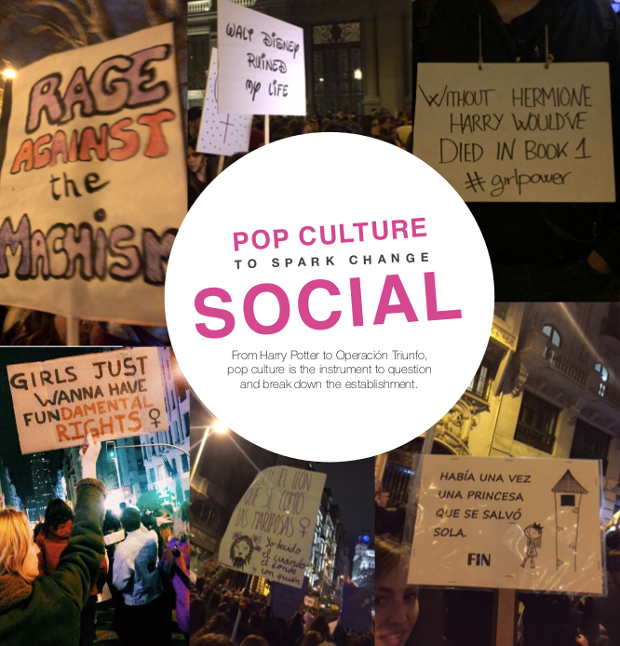
Marcelle Santos
“General exhaustion” was the sentiment that drove the women of Spain to down tools and take to the streets, in Kirsten Haack’s view. “It’s reached a point where women are a bit tired of having to work three times as hard in the workplace, in the home and in society,” the &Rosàs head of business says.
Kirsten is exhausted herself. She’s tired of talking about the disparities between men and women and being met with a roll of the eyes. “Well, yeah! The issues still stand,” she says. “The group that constitutes 50% of society is not given the same rights, opportunities and respect as the other half. The conversation must continue being on the forefront of everyone’s mind. At the end of the day it’s about making a whole society move forwards.”
This unique moment had been brewing for decades, by Marcelle’s reckoning. Spain had its feminist movement delayed by wars and political turbulences in the beginning of 20th century, she suggests, but since the dictatorship ended in the late ‘70s the fight for equality became stronger and more necessary. “The movement grew over recent decades and what we see now is the third generation of feminists, highly educated, with strong opinions and hyper-connected on social media” she says. “Feminists are now informed and organized in institutions and independent groups. Despite their ideological and political differences, all of them were invited to march and that unity gave a new impulse to the strike.”
The organisation that channelled these disparate energies into an act of mass social disobedience was the 8M Commission (named after the date of International Women’s Day, March 8th), which was created from different feminist assemblies throughout the Spanish territory, with the aim of generating change in society, to tackle gender inequality in all its aspects from the wage gap to discrimination and sexual violence. “There were two key factors,” says Marta. “The #MeToo global movement and all the social debate that was generated around the trial against ‘La Manada’ for accusations of rape and sexual abuse.”
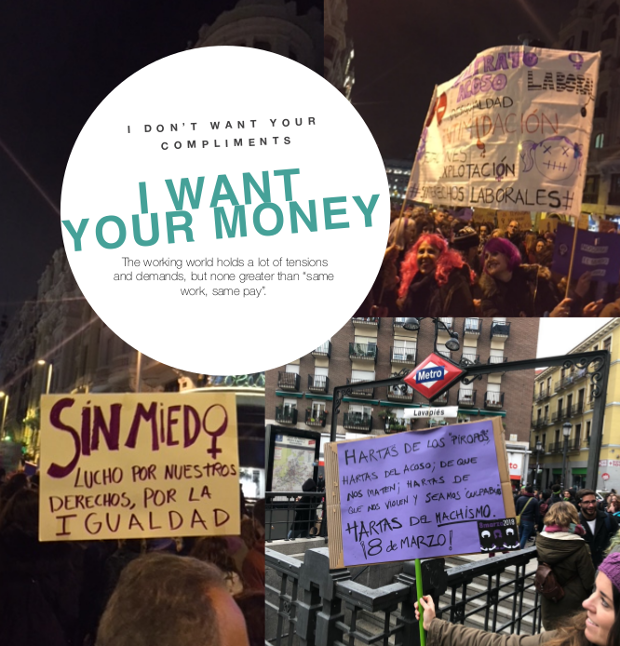
Marcelle Santos
The global reckoning of the #MeToo movement will be familiar to anyone who’s looked at a screen in the past year or so, but ‘La Manada’ was an important moment in the Spanish gender conversation, a focus for the Spanish-language #cuéntalo (tell it) movement, that gives women a space to tell their stories of abuse and harassment.
A highly divisive sexual assault case was going through the courts at the time of the strike. It was “a particularly ugly one,” Kirsten says. The defendants in the case were a group of five men self-styled as ‘La Manada’ (The Wolf Pack), who performed and filmed the rape of an 18-year-old woman as she was coming back from the Running of the Bulls in Pamplona. “Not only was the treatment of the rape survivor excruciating by judges, lawyers and the media,” says Kirsten, “but also the final resolution of the case shocked most of Spain.” In May 2018, the men were to be cleared of the charges of rape in favour of a lesser conviction.
In this climate of building frustration, the women of Spain’s advertising agencies mobilized. McCann Barcelona, where Marta was CCO at the time, supported all women who wanted to join the strike and as a gesture of support did not discount their day’s salary. Likewise &Rosàs backed all the women striking and offered the agency’s resources as a platform for them to tell their stories of they need to.
Elena García, creative director at PS21 says that 90% of women at her agency joined the strike in 2018. “The demonstrations on the March 8th normally have a festive tone,” she says, “but, last year, with the #MeToo hashtag as a wake-up call, Women’s Day became a day of reflection, sound and guerrilla. It was very emotional from an aesthetic point of view and at the same time powerful from the discourse perspective.”
PS21 (who were called Dommo at the time) also put out an apology for any chauvinistic advertising they’d been involved with throughout the years. It was published
in El Mundo, the second most read newspaper in Spain.
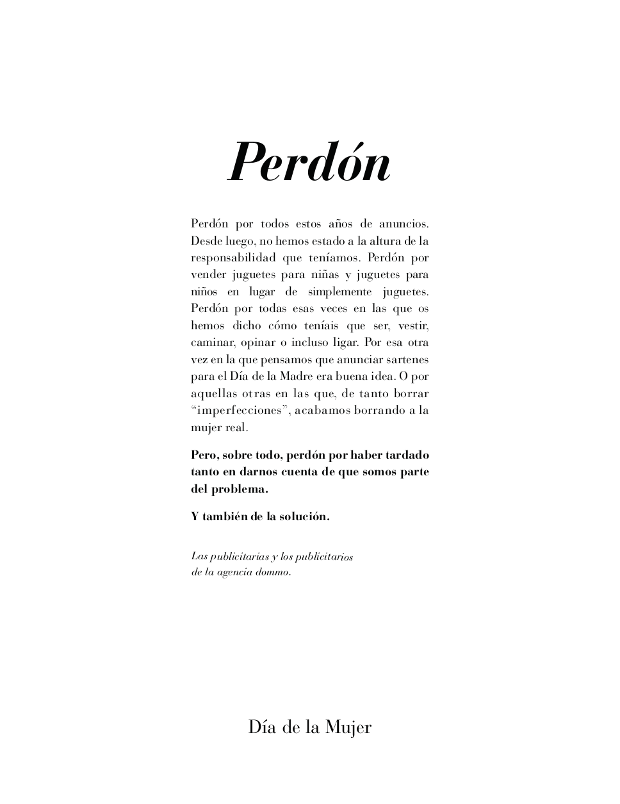
Marcelle saw a change suddenly come about in her agency too. “Last year was fundamental to raising awareness about diversity and gender equality in LOLA, most of it due to 2018’s march,” she says. “At first most of us weren’t considering going until we realized our own privileges and our responsibility on this topic. The women from LOLA decided to take a stand for all women’s demands.”
Marta was heartened to see support from her male colleagues at McCann. “Many male co-workers decided to go to work to fill our gap so that we could go out to the streets to claim them for ourselves,” she says. “Feeling the support of the vast majority of male colleagues made it a very emotional and special moment for all of us. We felt that we were not alone and that many men wanted to change our situation.”
“There was the overall understanding that this is not a fight that is only for women,” agrees Kirsten. “It is a conversation about the society we live in and men are just as engaged and responsible for that conversation and wanting for that shift to happen. What was amazing for me to see was that it has clearly become a social issue, and not a women's issue. That's when you know that things will change, when you unite as a society to drive those changes and what is becoming clearer every day is that gender inequality and feminist issues are not only a problem for women. When feminism becomes a male issue is when it will finally be put to rest.”
Sra Rushmore all supported the strike. The men in the agency joined the strike too, Xisela is proud to say of her agency. “We consider this to be a social problem, and as such, it is up to society to resolve it,” she says.
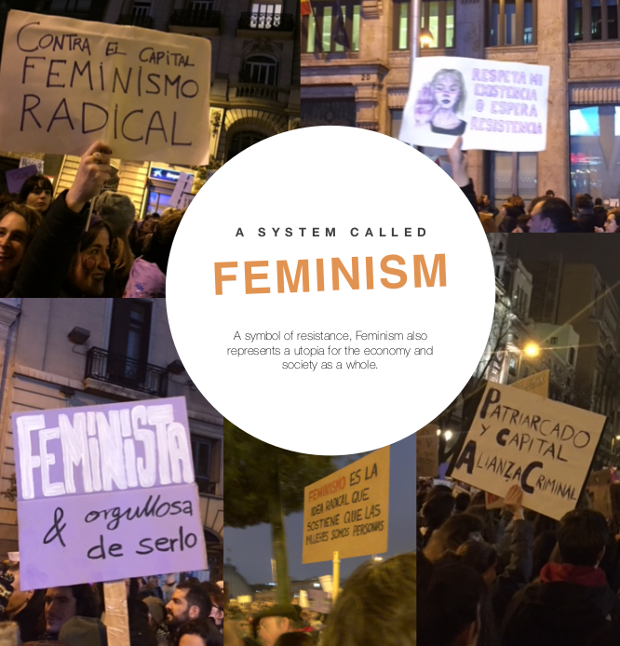
Marcelle Santos
The year following the strike has been a chance for Spain to continue its journey towards greater gender equality on the back of this transformative day. Several platforms and movements have sprung out of the spirit of March 8th, or have taken existing platforms much further. Kate Jenner of Little Black Book and WAP Spain has noticed the shift. “As a Brit who works with many Spanish creative companies I think it has to be said that women here take the topic of gender inequality very seriously, and that it most definitely is an existing issue,” she says. “This was demonstrated by the number of people who striked last 8M. Women are now sharing and exposing problems through channels like Más Mujeres Creativas [More Creative Women] and WAP. Mujeres a Seguir [Women to Follow] is also a good example of a Spanish initiative championing women. The APCP is also committed to investigating potential issues within the Spanish production industry. This is all extremely encouraging news but my feeling is there is still some nervousness to speak up individually on the day to day issues that working women face in this country."
Marta Llucia was one of the founders of Más Mujeres Creativas, which began before all this momentum really reached a tipping point. “The platform was born with the aim of giving visibility to the creative women of our country to encourage the presence of women in positions of responsibility within the creative departments of Spain,” she says.
Just weeks after last year’s strike, the outrageous ruling in the La Manada case took the Spanish feminist cause to its next level. “That was a big catalyst for Spanish women, and men, to stand up and start exposing some of the issues that women deal with every day,” says Kirsten. It fuelled social movements like #cuéntalo or Machismo Callejero, which began when two women decided to highlight the daily chauvinism they have to tolerate. Within three months over 35,000 followers had contributed to the Instagram account. Another response Kirsten highlights is Cientifica o Madre - a platform launched by a group of female scientists to highlight the impact that having a family has had on their careers versus their male peers.
After the sentencing of La Manada over 790,000 women had told their stories on the #cuéntalo hashtag, in two weeks over 3 million tweets were shared of women's experiences at the hands of an attacker or abuser. “These are very real issues as to how society views women,” says Kirsten. “And these issues have to be at the forefront of the reforms that are so desperately needed.”
But this goes beyond platforms and movements. “The statistics are there for all to see, but if we don't keep pointing at them, people would rather look the other way,” says Kirsten. “We are not only talking about the fact that women earn up to 24% less than men in the same job title and responsibilities, or that the percentile of women in leadership positions is of 27%. The issue is far deeper and rooted than in the workplace. For example, 80% of women are the caretakers of home and children, or that only 2% of men take or are allowed to take paternity leave. This means that women from the ages of 25-45 put their careers on hold to care for the home and family. Or let me point out further that in 2018 over 43,000 complaints were made against men for abuse, 47 women were murdered by their partners or ex-partners (nine in the first two months of 2019). With this in mind don’t you think it makes sense for people to make a stand?”
The strike woke up a sleeping feminist passion in the Spanish psyche. As Elena says: “The biggest victory has been to raise the voice to condemn a bigger number of sexist behaviours and to neutralise violent language. To develop a solid and coherent speech that has managed to empathise with a big part of society that seemed to be hibernating and, most importantly, make them react."
Socially many things have changed, although at a political and legal level the pressure has yet to have much effect. “We are still on the same point, things haven’t changed that much,” admits Marta. “What has changed is that women are more aware of the power we have when we unite and fight for the same cause.”
Xisela is interested to note that women in Spain seem to be taken into account more, but with a general election approaching in April this year, it’s hard to tell which promises are pure electioneering. “I don't know if it’s because it leads to votes or if there is an actual change occurring,” she says.
Whatever the reaction so far from the Spanish establishment, the March 8th women’s strikes look set to continue. Armed with more unity and knowledge from the past year of momentum, Spanish women will take to the streets again today. All agencies I spoke to said they would be supporting their striking workers.
“We’ve put the elephant in the room and there’s no turning back,” says Marcelle. “We still don’t know how, but we’ve all realised that we need to commit to the change. Brands, the government and NGOs are increasing awareness on women’s rights and ways to speak up. However, we’re still failing in the basics like setting up public policies on work, health and justice. We still have a LONG path ahead, but now we are unstoppable.”













